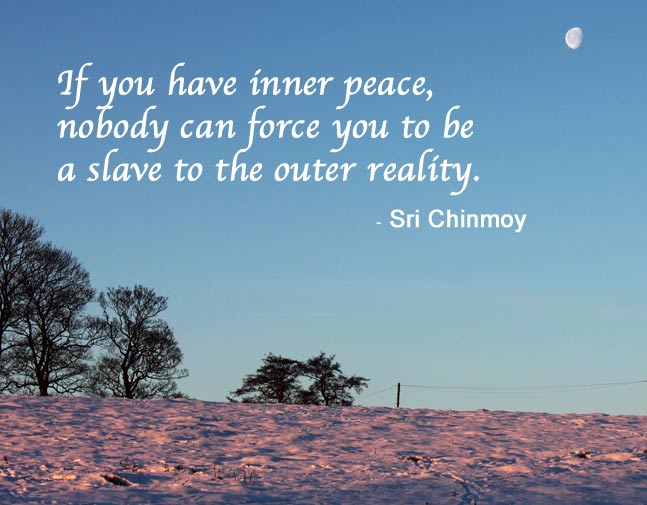
We are constantly judging other people, our self and situations. It can feel like life is a constant reality TV show with a panel of judges always in evidence. But, the judgemental nature of the mind, will neither give us peace or happiness. To attain a real inner peace, we have to go far beyond the judgemental game of inferiority and superiority.
Why Be Less Judgemental
We Suffer
When we judge others, it’s hard to not have a feeling (consciously or unconsciously) of superiority / pride. When we judge others we lower our own consciousness.
“If we judge others with our unlit human mind, with the intellectual mind, with the sophisticated mind, the persons whom we judge do not lose an iota of their achievement, of their reality. But we lose. How do we lose? When we start doubting others, we offer something of our own existence to the outer world something of our own reality goes and eventually we become very weak.”
– Sri Chinmoy (1)
We may be Wrong.
When judging others we are often judging only a small part of their nature. It may even be second hand information. We may hear someone’s opinion and take it as gospel. But, who is to say they haven’t put their own slant and perspective on the other person. Even when we seem someone first hand we may misunderstand their motives or inner attitude. We can never know what is going on inside a person. Every is fighting their own battles and trying to be a better person in their own way. We cannot expect every to be at the stage of sainthood in this incarnation.
How would we want to be judged?
When we do something good, of course, we want the whole world to know about it. But, when we do something bad or unfortunate we would really like it to be kept quiet. If we take delight in people’s misfortunes then it is a big mistake, and it is likely to happen to us.
How To Be Less Judgemental
Be Sympathetic
When we see someone doing something wrong, we can feel that this is something we could be doing wrong ourselves. Ironically, when we criticise faults in others, we often have the same faults ourselves. If we remember we are as prone to misjudgement and doing the wrong thing then it gives us more compassion and understanding.
Be supportive not critical.
Judging others rarely helps to change others behaviour for the better. Being supportive can change.
Concentrate on Being Happy.
When we get bogged down in judging others, we wont gain much happiness. Happiness comes from enjoying the good things in life, not in giving sermons on the failings of the world.
Look Upon People as an Extended Family.
If someone close to us does something wrong we are more willing to forgive and see their better qualities. When judging friends or work colleagues see them as an extended part of your self / family, this will give us a more sympathetic approach.
Being Right Isn’t the Most Important Thing.
In judging others, there is a strong desire to be right and show others as wrong. But life isn’t all about being right. It’s about quietly making a positive contribution.
Judge Only Yourself.
“Why do you look at the speck of sawdust in your brother’s eye and pay no attention to the plank in your own eye” Matthew 7:3
If we have to judge, why not judge yourself and see how you can improve yourself as a person? Don’t make the mistake of blaming your difficulties on others. Difficulties come from some defect in our own character.
Dealing With Judgemental People.
Some people are very judgemental. They have a habit of making us feel small / guilty. It also encourages us to be judgemental in response. We either seek to defend ourselves or start judging others – joining in their game of judging people.
It can also be difficult to disagree with judgemental people, as they often can have deep conviction in their beliefs.
The best way of dealing with judgemental people is not to directly challenge them, but, allow them to go their way, whilst we maintain our quiet approach. Don’t worry about having the last word or defending yourself. If they are really making unfair criticisms of friends, you can always point to their good qualities. But, you are unlikely to change their nature so don’t expect too much.
Related
(1) Warriors of the Inner World by Sri Chinmoy
Photo Top, Tejvan, New College, Oxford









